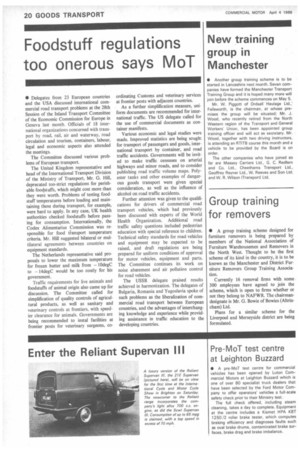Foodstuff regulations too onerous says MoT
Page 22

If you've noticed an error in this article please click here to report it so we can fix it.
• Delegates from 23 European countries and the USA discussed international commercial road transport problems at the 28th Session of the Inland Transport Committee of the Economic Commission for Europe in Geneva last month. Officials of 18 international organizations concerned with transport by road, rail, air and waterway, road circulation and tourism, containers, labour. legal and economic aspects also attended the meetings.
The Committee discussed various problems of European transport The United Kingdom representative and head of the International Transport Division of the Ministry of Transport. Mr. G. Hill, deprecated too-strict regulations for perishable foodstuffs, which might cost more than they were worth. Problems of testing foodstuff temperatures before loading and maintaining these during transport, for example, were hard to apply. In any case, UK health authorities checked foodstuffs before passing for consumption. Internationally, the Codex Alimentarius Commission was responsible for food t?ansport temperature criteria. Mr. Hill suggested bilateral or multilateral agreements between countries on equipment standards.
The Netherlands representative said proposals to lower the maximum temperature for frozen butter and milk from —10degC to —14degC would be too costly for his government.
Traffic requirements for live animals and foodstuffs of animal origin also came up for discussion. The Committee called for simplification of quality controls of agricultural products, as well as sanitary and veterinary controls at frontiers. with speedier clearance for animals. Governments are being recommended to instal facilities at frontier posts for veterinary surgeons, co
ordinating Customs and veterinary services at frontier posts with adjacent countries.
As a further simplification measure, uniform documents are recommended for international traffic. The US delegate called for the use of commercial documents as container manifests.
Various economic and legal studies were made. Improved statistics are being sough: for transport of passengers and goods, international transport by container, and road traffic accidents. Governments will be invited to make traffic censuses on arterial highways and minor roads, and to consider publishing road traffic volume maps. Polyester tanks and other examples of dangerous goods transport were given special consideration, as well as the influence of alcohol on road traffic accidents.
Further attention was given to the qualifications for drivers of commercial road transport vehicles, which had previously been discussed with experts of the World Health Organization. Additional road traffic safety questions included pedestrian education with special reference to children. Technical safety standards for road vehicles and equipment may be expected to be raised, and draft regulations are being prepared for uniform conditions of approval for motor vehicles, equipment and parts. The Committee continues its work on noise abatement and air pollution control for road vehicles.
The USSR delegate praised results achieved in harmonization. The delegates of Bulgaria. Romania and Yugoslavia spoke of such problems as the liberalization of commercial road transport between European countries, and the advantages of interchanging knowledge and experience while providing assistance in traffic education to the developing countries.










































































































